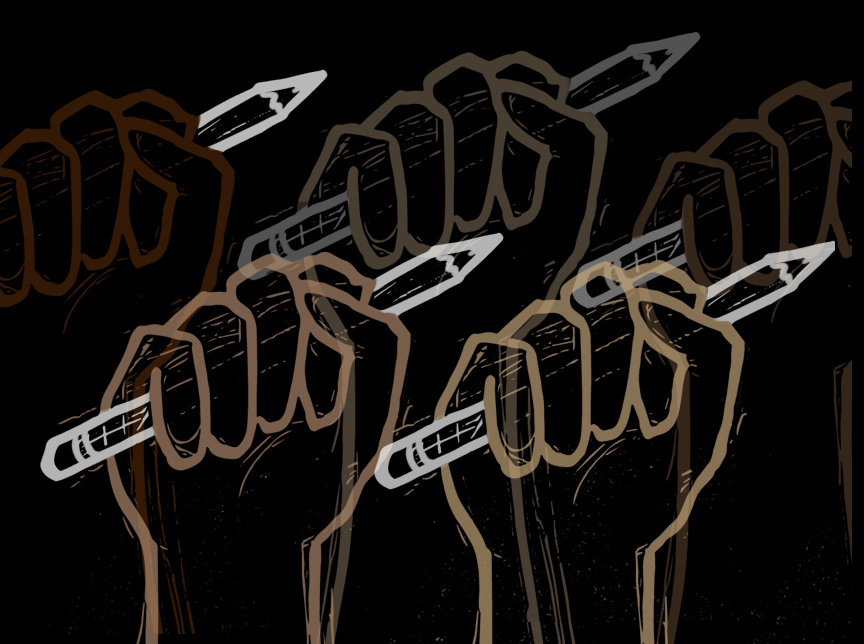Martinez: Diversity is not an empty promise
January 8, 2019
It’s something opinion editors, and The Daily itself, have said, time and time again — we’re committed to doing better.
That’s a statement marginalized people have heard since the beginning of time. Empty promises from teachers, friends, organizations and corporations, all promising a shiny, new “better” backed only by air.
This quarter will truly be different. My campaign to diversify and uplift the opinion section is not only fueled by an endearing hope for change, but also by anger and frustration.
I am one of two black editors this quarter and one of a few Latinx ones. Based on our diversity report last year, our staff was woefully under-representative of the Northwestern undergraduate population. That’s not a new trend for The Daily, and it’s not getting better.
That’s upsetting for many reasons. First of all, it means we don’t have a lot of diverse reporters and columnists in the room to pitch stories, interview people and write pieces for us. The value of inclusion at this level cannot be overstated. Having a variety of backgrounds present at the very beginning of a story means the angle will be as specific as possible. From there, the writer can use learned context and experiences to influence how they interview and produce the piece, making the final product more nuanced and informative.
However, having a diverse staff means nothing without requiring the same of an editorial board. Editors are the last stop before publication — they are expected to not only adjust the grammar and style, but also to have the foresight for potentially broader issues. They should regularly educate themselves on a variety of viewpoints and perspectives and make sure they communicate the truth, rather than the stereotypes that plague our campus, city and country.
But right now, we don’t have the requisite diversity in our writing base or editing staff at The Daily. Don’t get me wrong — I have met many wonderful individuals at this paper and read some amazing work over the past two years. That doesn’t negate our problem.
This anger and frustration will stay with me for the rest of my career. It started early for me at my high school paper, where I was the first black or Latinx editor in years, and continued to college, where Medill students and faculty are overwhelmingly homogenous. In terms of careers, the prospects don’t look much better. Newsrooms are getting more diverse, but marginally so, despite several social movements and attempts to include underrepresented voices.
That’s why my promises aren’t empty — this problem is deeply personal for me. It affects my life in more ways than I can count. I feel the pain of not reading about people who look like me in the paper, then walking into a newsroom filled with the people who published that same paper. I certainly don’t blame people for being hesitant to join The Daily. It can seem intimidating, intense and overwhelmingly white, upper-class and straight (because it is). Reporters, columnists and editors have made mistakes that have made me shake with anger. Sometimes it feels like the only option is to quit.
But I’ve already made a commitment. I’m dedicated to changing the culture inside The Daily and our recruitment process, as are many of my colleagues. We are excited to keep changing the institutional barriers that have long existed at this publication. Opening the opinion section to more voices and making them feel welcome is important to me and other editors at this paper.
Over the next quarter, I am dedicating myself to breaking a variety of limitations that have kept strong writers from our staff. I genuinely want to learn how to create a more inclusive environment that reflects the beautiful array of people at this university and in this city. This doesn’t come from a place of tokenization, but from a place of love. I love journalism, and I want others to adore it like I do. I’ve seen the destruction a bad story can do, but I’ve also seen the positive change that can come from a good one.
There are so many interesting and powerful voices on campus, and in the past, The Daily has failed them. I promise to fight for these voices and make this paper as inclusive as it should be.
Marissa Martinez is a Medill sophomore. She can be contacted at [email protected]. If you would like to respond publicly to this column, send a Letter to the Editor to [email protected]. The views expressed in this piece do not necessarily reflect the views of all staff members of The Daily Northwestern.


